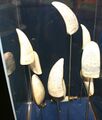Template:Selected anniversaries/April 11: Difference between revisions
No edit summary |
No edit summary |
||
| Line 1: | Line 1: | ||
<gallery> | <gallery> | ||
||1626 | ||1626: Marino Ghetaldi dies ... mathematician and physicist. | ||
||1755 | ||1755: James Parkinson born ... surgeon, geologist, and paleontologist. | ||
File:Jean-André Lepaute.jpg|link=Jean-André Lepaute (nonfiction)|1789: Clockmaker [[Jean-André Lepaute (nonfiction)|Jean-André Lepaute]] dies. He was an innovator, introducing numerous improvements in clockmaking, especially his pin-wheel escapement, and his clockworks in which the gears are all in the horizontal plane. | File:Jean-André Lepaute.jpg|link=Jean-André Lepaute (nonfiction)|1789: Clockmaker [[Jean-André Lepaute (nonfiction)|Jean-André Lepaute]] dies. He was an innovator, introducing numerous improvements in clockmaking, especially his pin-wheel escapement, and his clockworks in which the gears are all in the horizontal plane. | ||
||1798 | ||1798: Macedonio Melloni born ... physicist and academic. | ||
||Otto Linné Erdmann | ||1804: Otto Linné Erdmann born ... chemist. | ||
||Thomas Hornsby | ||1810: Thomas Hornsby born ... astronomer and mathematician. | ||
||Karl Hermann Knoblauch | ||1820: Karl Hermann Knoblauch born ... physicist. He is most notable for his studies of radiant heat. He was one of the six founding members of the Deutsche Physikalische Gesellschaft at Berlin on 14 January 1845. Pic. | ||
||1862 | ||1862: William Wallace Campbell dies ... astronomer and academic (d. 1938) | ||
||John Park Finley | ||1854: John Park Finley born ... meteorologist and Army Signal Service officer who was the first person to study tornadoes intensively. He also wrote the first known book on the subject as well as many other manuals and booklets, collected vast climatological data, set up a nationwide weather observer network, started one of the first private weather enterprises, and opened an early aviation weather school. Pic. | ||
||Otto Linné Erdmann | ||1869: Otto Linné Erdmann dies ... chemist. | ||
||Samuel Heinrich Schwabe | ||1875: Samuel Heinrich Schwabe dies ... astronomer remembered for his work on sunspots. | ||
|| | ||1894: Mathematician Paul Finsler born. Finsler spaces will be named after him by Élie Cartan in 1934. The Hadwiger–Finsler inequality, a relation between the side lengths and area of a triangle in the Euclidean plane, is named after Finsler and his co-author Hugo Hadwiger, as is the Finsler–Hadwiger theorem on a square derived from two other squares that share a vertex. Pic: https://neurosophie.wordpress.com/2015/03/22/paul-finsler-und-eine-welt-ohne-widerspruche/ | ||
|| | ||1895: Julius Lothar Meyer dies ... chemist. | ||
||Donald Howard Menzel | ||1899: Percy Lavon Julian born ... chemist and academic. | ||
||1901: Donald Howard Menzel born ... one of the first theoretical astronomers and astrophysicists in the United States. He discovered the physical properties of the solar chromosphere, the chemistry of stars, the atmosphere of Mars, and the nature of gaseous nebulae. Pic. | |||
||1904: Alberto González Domínguez born ... mathematician working on analysis, probability theory and quantum field theory. | ||1904: Alberto González Domínguez born ... mathematician working on analysis, probability theory and quantum field theory. | ||
| Line 54: | Line 55: | ||
File:The Eel Escapes Hydrolab.jpg|link=The Eel Escapes Hydrolab|1956: Art critic and alleged supervillain [[The Eel]] escapes from [[The Nacreum]], says he has been framed for crimes he did not commit by the enemies of Cornelius Drebbel. | File:The Eel Escapes Hydrolab.jpg|link=The Eel Escapes Hydrolab|1956: Art critic and alleged supervillain [[The Eel]] escapes from [[The Nacreum]], says he has been framed for crimes he did not commit by the enemies of Cornelius Drebbel. | ||
||1961 | ||1961: The trial of Adolf Eichmann begins in Jerusalem. | ||
File:Nakaya Ukichiro in 1946.jpg|link=Ukichiro Nakaya (nonfiction)|1962: Physicist and academic [[Ukichiro Nakaya (nonfiction)|Ukichiro Nakaya]] dies. He created the first artificial snowflakes. | File:Nakaya Ukichiro in 1946.jpg|link=Ukichiro Nakaya (nonfiction)|1962: Physicist and academic [[Ukichiro Nakaya (nonfiction)|Ukichiro Nakaya]] dies. He created the first artificial snowflakes. | ||
||1970 | ||1970: Apollo 13 is launched. | ||
||Mauro Picone | ||1977: Mauro Picone dies ... mathematician. He is known for the Picone identity, and the Sturm-Picone comparison theorem. He was also an outstanding teacher of mathematical analysis: some of the best Italian mathematicians were among his pupils. Pic. | ||
File:Viking orbiter.jpg|link=Viking 2 (nonfiction)|1980: Viking program: After operating on the surface of Mars for 1316 days (1281 sols), the [[Viking 2 (nonfiction)|Viking 2]] lander is turned off when its batteries fail. | File:Viking orbiter.jpg|link=Viking 2 (nonfiction)|1980: Viking program: After operating on the surface of Mars for 1316 days (1281 sols), the [[Viking 2 (nonfiction)|Viking 2]] lander is turned off when its batteries fail. | ||
||1987 | ||1987: Primo Levi dies ... chemist and author. | ||
||1990 | ||1990: Customs officers in Middlesbrough, England, seize what they believe to be the barrel of a massive gun on a ship bound for Iraq. | ||
||Ivar Waller | ||1991: Ivar Waller dies ... professor of theoretical physics at Uppsala University. He developed the theory of X-ray scattering by lattice vibrations of a crystal, building upon the prior work of Peter Debye. Pic. | ||
File:Venus Express in orbit.jpg|link=Venus Express (nonfiction)|2006: The [[Venus Express (nonfiction)|Venus Express]] spacecraft arrives at Venus after 153 days of journey, and begins continuously sending back science data from its polar orbit around Venus. | File:Venus Express in orbit.jpg|link=Venus Express (nonfiction)|2006: The [[Venus Express (nonfiction)|Venus Express]] spacecraft arrives at Venus after 153 days of journey, and begins continuously sending back science data from its polar orbit around Venus. | ||
||2003 | ||2003: Cecil Howard Green dies ... geophysicist and businessman, founded Texas Instruments. | ||
||2006 | ||2006: Iranian president Mahmoud Ahmadinejad announces Iran's claim to have successfully enriched uranium. | ||
File:Dennis_Paulson_of_Mars.jpg|link=Dennis Paulson of Mars|2017: [[Dennis Paulson of Mars|Dennis Paulson]] calls for a moment of silence in recognition of the thirty-seventh anniversary of NASA switching off the [[Viking 2 (nonfiction)|Viking 2]] spacecraft. | File:Dennis_Paulson_of_Mars.jpg|link=Dennis Paulson of Mars|2017: [[Dennis Paulson of Mars|Dennis Paulson]] calls for a moment of silence in recognition of the thirty-seventh anniversary of NASA switching off the [[Viking 2 (nonfiction)|Viking 2]] spacecraft. | ||
</gallery> | </gallery> | ||
Revision as of 19:36, 2 September 2018
1789: Clockmaker Jean-André Lepaute dies. He was an innovator, introducing numerous improvements in clockmaking, especially his pin-wheel escapement, and his clockworks in which the gears are all in the horizontal plane.
1913: Physicist, inventor, and crime-fighter Nikola Tesla uses polyphase alternating current technology to detect and prevent crimes against physical constants.
1914: Mathematician Dorothy Lewis Bernstein born. She will be the first woman to be elected president of the Mathematics Association of America.
1923: Outbreak of Scrimshaw abuse in Seattle and Portland blamed on new class of crimes against mathematical constants.
1955: The Air India Kashmir Princess is bombed and crashes in a failed assassination attempt on Zhou Enlai.
1956: Art critic and alleged supervillain The Eel escapes from The Nacreum, says he has been framed for crimes he did not commit by the enemies of Cornelius Drebbel.
1962: Physicist and academic Ukichiro Nakaya dies. He created the first artificial snowflakes.
1980: Viking program: After operating on the surface of Mars for 1316 days (1281 sols), the Viking 2 lander is turned off when its batteries fail.
2006: The Venus Express spacecraft arrives at Venus after 153 days of journey, and begins continuously sending back science data from its polar orbit around Venus.
2017: Dennis Paulson calls for a moment of silence in recognition of the thirty-seventh anniversary of NASA switching off the Viking 2 spacecraft.









